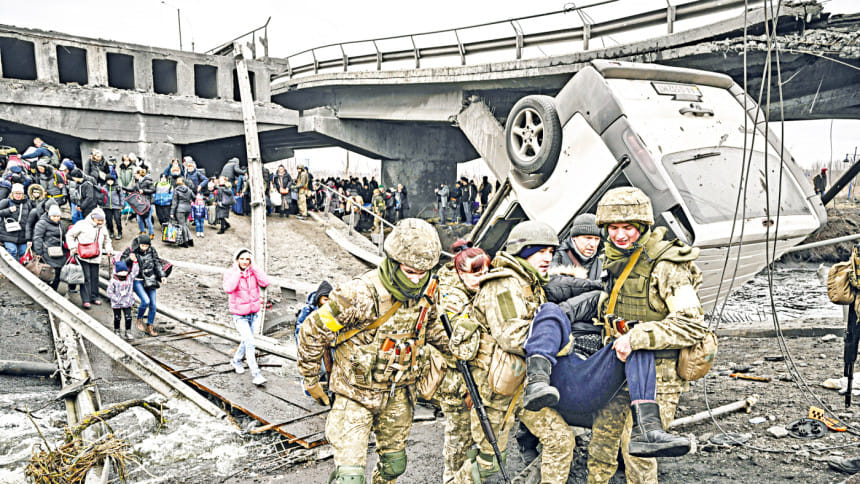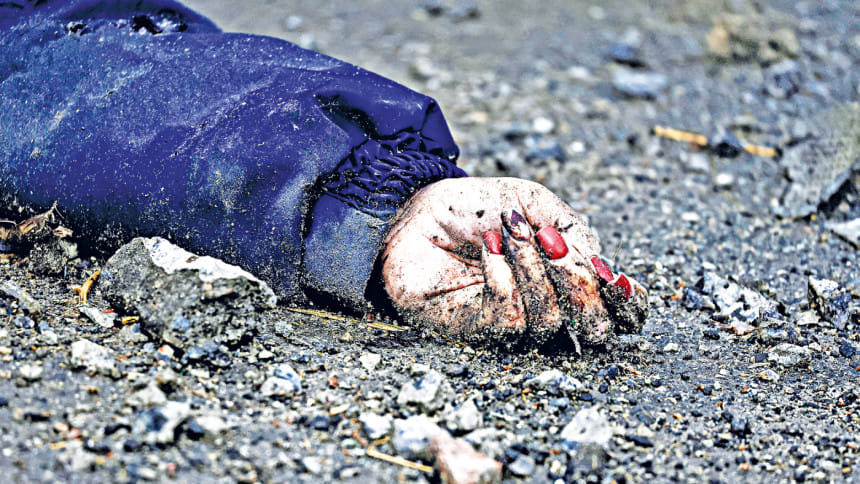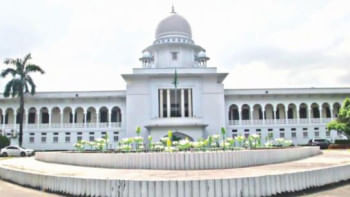Can Ukraine survive in 2023?

Russia's invasion of Ukraine plunged Europe into its biggest land war since World War Two, igniting a conflict that has killed thousands, displaced millions, pulverised Ukrainian cities and damaged the global economy.
Despite warnings from US intelligence in the run-up to Feb. 24, many European and Ukrainian officials did not believe it would happen. It was far too much for the Russian army to bite off, went the thinking.
Putin, who turned 70 in October, was, however, incensed by what he saw as Ukraine's treacherous Westwards pivot, and ordered an invasion - which he called "a special military operation" - nonetheless.

His goal was to root out what he saw as excessive and potentially dangerous Western influence in an area where Moscow once held sway and to speed up what he saw as an inevitable historical shift to a multi-polar world.
Russia's initial aim was to overrun Ukraine and depose its government. However, it now appears to have limited its ambitions to securing land in Ukraine's east and south.
When in September he announced the annexation of four Ukrainian regions his troops partially controlled, a move the West declared illegal, his desire to enlarge Russia, already the world's biggest country by territory, became explicit.
The war has so far not gone well for Putin. His forces were beaten back from the Ukrainian capital and then from the north-eastern Kharkiv region. In November, they were forced to quit the southern city of Kherson and the River Dnipro's west bank.
As winter sets in, his army, which still controls a large chunk of Ukraine, has had more success at destroying Ukrainian infrastructure, inflicting prolonged power and water outages, something Moscow says has a military purpose. Ukraine has accused Russia of terrorism.
Despite military setbacks and political infighting, eight sources told Reuters in October that Putin's grip on power remained firm and unofficial polls give him a 70-80 percent approval rating. Some said that could change fast if defeat beckoned.
Nato, an alliance that French President Emmanuel Macron said in 2019 was in the grips of "brain death", is poised to add Finland and Sweden even though its further expansion was the very thing Putin opposed.
Ukraine, which before Feb. 24, had sometimes struggled to get the West interested in a slow-burning war against Russian proxies in its east, has received aid and Western support that once seemed unimaginable.
And Russia, one of the world's biggest energy and commodity producers, has been hit with the harshest Western sanctions in its modern history.
That and its own retaliatory measures have shrunk its role as one of Europe's biggest oil and gas suppliers, disrupted global grain and fertiliser markets, fuelled global inflation and increased nuclear tensions to their highest level since the Cuban Missile crisis.
With Ukraine adamant that Russia withdraw from its territory before any peace talks happen, including from annexed Crimea, even a temporary ceasefire looks hard to achieve.

For Russia, 2023 is likely to be a year when it tries to stave off more Western attempts to isolate it.
Political leaders in Iran, North Korea and Belarus remain staunch supporters. China and India have stepped in to buy heavily discounted Russian oil, though Beijing has not been as full-throated in its public support of Moscow as expected.
Moscow will have to manage its sanctions-hit economy too, a task made harder after the exodus of young men. Economic stability is linked to political stability, which the authorities have tried to ensure by intensifying a crackdown on anyone perceived a threat.
Reuters reported in November that Russia plans to spend nearly a third of its 2023 budget on defence and domestic security while slashing funding for schools, hospitals and roads.
As Putin pays up to keep the war in Ukraine grinding on, managing its fallout at home and abroad is likely to get harder.
However, despite the battlefield defeats, Russia still has destructive military capabilities it can call upon.
Despite US President Joe Biden's promise to his Ukrainian counterpart Volodymyr Zelensky during his half–day visit to Washington in December that Kyiv will have US backing "as long as it takes", pressure for a negotiated outcome is getting stronger.
In November, General Mark Milley, chairman of the US Joint Chiefs of Staff, sent shock waves through Western capitals when he declared that the war in Ukraine is unwinnable by purely military means. Milley suggested that Ukraine is now in a position of strength and that this winter might be the moment to consider peace talks with Russia.
During the US trip, Zelensky earned firm pledges of support from and US lawmakers whom he addressed in Congress.
But the thin attendance of Republicans for the Ukraine leader's congressional address, and Biden's reticence to provide him powerful offensive weapons, citing allies' concerns, showed there remained limits to the support.
Defense analysts say he needs more concrete battlefield gains to sustain US and Nato backing through 2023 and fend off pressure to negotiate with Moscow.

Despite securing $45 billion in aid for Ukraine, and a new $1.85 billion arms package, the White House continued to hold back on Ukraine's requests for more, like longer-range ATACMS missiles, advanced attack drones and F-16 fighter jets.
In explaining why in a joint press conference with Zelensky, Biden indicated fragility of allied support for the war.
"They understand it (the situation) fully, but they're not looking to go to war with Russia."
Michael Horowitz, head of intelligence at LeBeck International, a Middle East security consultant, said there are "unexpressed concerns" among allies over whether Zelensky's goal of retaking all of Ukraine, including Crimea, from Russia is achievable.
"As the Russian invasion stalls, Putin is counting on war fatigue, both inside and outside of Ukraine, to force Kyiv into settling," said Horowitz.
That is the goal of Russia's "winter strategy" of attacking Ukraine's electricity network and driving up food and fuel prices globally, he said.
Seth Jones of the Center for Strategic and International Studies in Washington said all indications from Moscow point to a "protracted war and willingness to spend whatever it takes."
On Wednesday, Russia's foreign minister said he was convinced that Moscow would achieve its goals in Ukraine thanks to its "patience" and "perseverance".
He reiterated Moscow's stance that for talks to resume Kyiv should recognise the annexation by Russia of four Ukrainian regions.
Russia does not currently control the regions of Donetsk, Lugansk, Kherson and Zaporizhzhia in full, and Lavrov confirmed that was Moscow's ultimate goal.
Lavrov said that while Moscow wanted the conflict to be over, Russia would take its time to achieve its goals on the battlefield.
"We are in no hurry," he said.

 For all latest news, follow The Daily Star's Google News channel.
For all latest news, follow The Daily Star's Google News channel. 



Comments